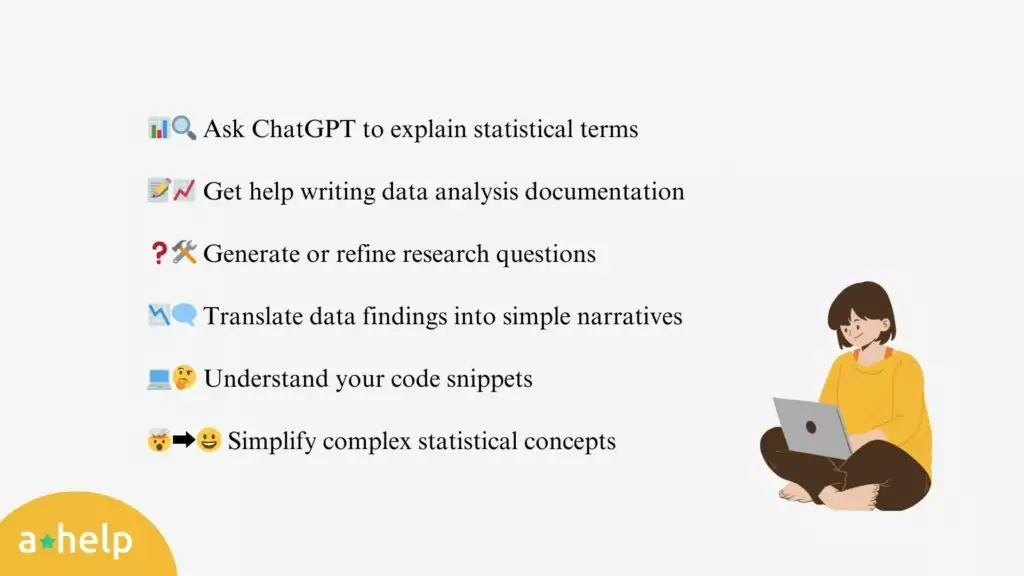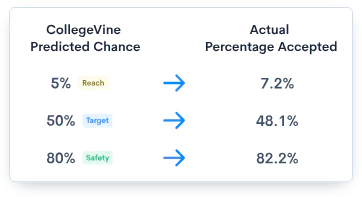Navigating the college admissions process can be daunting, and having a reliable tool to help predict your chances of acceptance can be invaluable. CollegeVine’s Chances Calculator is one such tool that claims to provide insight into your likelihood of getting into your dream schools. In this article, we’ll explore the accuracy of the CollegeVine Chances Calculator and its effectiveness in helping students make informed decisions about their college applications.

✅ AI Essay Writer ✅ AI Detector ✅ Plagchecker ✅ Paraphraser
✅ Summarizer ✅ Citation Generator
Feedback from the Reddit Community
Mixed Results
Some students reported that CollegeVine’s Chances Calculator provided accurate predictions for their college admissions outcomes. However, others found that the calculator’s predictions were not always accurate, with some being over- or under-optimistic.
Personal Factors
A common theme among the experiences was that the calculator may not account for every personal factor that plays a role in college admissions. This highlights the importance of taking the calculator’s predictions with a grain of salt since it can’t account for every aspect of a student’s application.
Admissions Process Complexities
Several students highlighted the inherent complexities of the college admissions process, which can make accurate predictions challenging. Even if the calculator’s predictions are not entirely accurate, it could still be a useful tool for gauging one’s chances and identifying reach and safety schools.
Valuable Starting Point
Despite its limitations, many students found value in using CollegeVine’s Chances Calculator as a starting point for their college search. The calculator helped some students identify schools they may have overlooked or dismissed as too competitive.
The Importance of Context
A few students emphasized the importance of considering the context in which the calculator’s predictions are made. Keeping in mind that individual circumstances can significantly impact the outcome is essential.
Unexpected Outcomes
There were stories of unexpected outcomes in college admissions journeys that the calculator didn’t predict]. This proves the importance of remaining hopeful and applying to your dream schools despite the predictions].
The Role of Extracurriculars
Several students discussed the role of extracurricular activities (ECs) in their college applications and how CollegeVine’s Chances Calculator accounted for them. Some students realized that they needed to bolster their ECs to increase their chances of admission.
Personal Essay Impact
Some students emphasized the importance of personal essays in the admissions process and how the calculator might not accurately factor them in. Crafting a compelling personal essay that showcases your unique qualities and experiences can make a difference in your college admissions outcomes.
Regional Considerations
A few students pointed out that the calculator might not take regional considerations into account, which can play a role in the admissions process. Researching schools in your region and considering how your geographic location might impact your chances of admission is essential.
CollegeVine’s Evolving Accuracy
Some students acknowledged that CollegeVine’s Chances Calculator is continually evolving and improving its accuracy. As users continue to engage with the platform and provide feedback, the calculator may become more reliable and accurate over time.
Understanding CollegeVine’s Chances Calculator
CollegeVine’s Chances Calculator uses a combination of data points, including a student’s stats, extracurriculars (ECs), and the schools they’re applying to, in order to estimate their chances of acceptance. It considers various factors like a student’s qualifications, the competitiveness of their desired majors, and the fit between the student and their chosen institutions.
The Importance of Accurate Predictions
An accurate college admissions calculator can be a valuable resource for students and their counselors as they navigate the complex process of selecting schools and crafting applications. By providing a realistic assessment of a student’s chances at their dream schools and reach schools, these tools can help students make informed decisions about where to apply and how to present themselves in their applications.
Factors Influencing CollegeVine’s Accuracy
While CollegeVine’s Chances Calculator is designed to provide students with useful estimates of their college admission chances, its accuracy can be influenced by several factors:
- Data quality: The calculator relies on accurate and up-to-date information about college admissions statistics, acceptance rates, and other relevant data. Changes in these figures can impact the accuracy of the calculator’s predictions.
- Personal factors: The CollegeVine Chances Calculator accounts for a student’s stats and ECs, but it may not fully capture the nuances of an individual’s background, experiences, and achievements. Additionally, some aspects of the college admissions process, such as essays and interviews, are subjective and may not be accurately predicted by the calculator.
- College admissions trends: The college admissions landscape is constantly changing, and factors like increased application numbers or changes in admissions policies can impact the accuracy of the calculator’s predictions.
Assessing the Accuracy of CollegeVine’s Chances Calculator
Although the CollegeVine Chances Calculator has its limitations, many students and counselors have found it to be a helpful tool in estimating college admission chances. It’s important to remember that no calculator can guarantee acceptance or rejection, but CollegeVine’s tool can serve as a useful starting point for students as they plan their college application strategy.
To get the most out of the CollegeVine Chances Calculator, students should use it in conjunction with other resources like college rankings, school profiles, and guidance from their counselor or mentor. By taking a holistic approach to the college admissions process, students can maximize their chances of finding the best fit for their goals and aspirations.
Conclusion
While the CollegeVine Chances Calculator may not be perfect, it’s a valuable tool for students navigating the college admissions process. By using the calculator alongside other resources and seeking guidance from experienced professionals, students can make informed decisions about their college applications and increase their chances of finding the right school for them.
The Extracurricular Edge: Boosting Your College Application
Beyond academics, colleges take a keen interest in a student’s extracurricular activities. These pursuits offer a glimpse into a student’s character, dedication, and skills, providing a fuller picture of the applicant. College admissions officers look for involvement in extracurriculars as a signal of a student’s potential for a well-rounded, productive college experience. However, it’s not just about the number of activities, but also the quality, level of commitment, and growth demonstrated through these pursuits.
| Key Factors in Extracurricular Activities | How They Influence the Admission Process |
|---|---|
| Leadership | Demonstrates your ability to motivate others, make decisions, and contribute positively to a community. This could be serving as a club president, team captain, or project lead. |
| Long-term Commitment | Shows dedication and perseverance. Colleges value students who show commitment to their passions over an extended period. |
| Depth of Involvement | Rather than having a long list of activities with superficial involvement, colleges prefer activities where students have taken substantial roles or made significant contributions. |
| Passion and Personal Interest | Activities that align with your personal interests and passions can demonstrate authenticity and give insight into your personal qualities and values. |
| Uniqueness | Unique activities can help you stand out among applicants, revealing your individuality and diverse interests. |
| Relevance | If your activities relate to your intended major or career path, it indicates direction and commitment to your field of interest. |
Remember, when it comes to extracurriculars, the goal isn’t to pad your resume with an endless list of activities. Instead, focus on meaningful involvement that exhibits personal growth, passion, and commitment. It’s about quality over quantity, and this approach can greatly enhance your college application.
Essential Tips & Tricks for Using ChatGPT in Data Analysis
OpenAI’s ChatGPT, a sophisticated AI language model, can be a powerful ally in data analysis. While it might not directly analyze data like a statistical software, its ability to understand, generate, and manipulate language can greatly assist in processing and interpreting results, documenting findings, and even creating simple data-driven narratives. Here’s how to make the most of ChatGPT in data analysis:
- After performing statistical analysis, you can ask ChatGPT to explain the meaning of specific statistical terms or concepts that come up in your results, thus assisting in interpreting your findings.
- ChatGPT can help you write clear, comprehensive documentation for your data analysis process. Just provide the details, and it can generate a descriptive narrative. For example: “Describe the process of conducting a linear regression analysis using a dataset of house prices and their features.”
- You can use ChatGPT to generate or refine research questions or hypotheses based on your initial observations. If you have initial data observations, you can ask, “Based on the observation that older houses tend to have lower prices, what are some potential research questions or hypotheses?”
- ChatGPT can help you translate complex data findings into understandable narratives, which can be invaluable when presenting results to non-technical audiences. For instance, “Translate the finding that as the age of a house increases, its price tends to decrease, into a simple narrative.”
- If you’re using code for your data analysis (such as Python, R, or SQL), you can ask ChatGPT to explain what specific code snippets do, helping you better understand and debug your code. If you have a piece of code in Python like
df['price'].mean(), you can ask, “What does the Python codedf['price'].mean()do?” - ChatGPT can help simplify complex statistical or data concepts, making them easier to understand. If you’re struggling to understand a complex concept like “multicollinearity,” you can ask, “Can you explain multicollinearity in simple terms?”
Remember, while ChatGPT is a robust tool, it’s not a replacement for statistical software or a deep understanding of data analysis methods. It should be used as a complementary tool to support your data analysis tasks.

Insights from Admissions Experts
The AcademicHelp team got in touch with college admissions and career experts and asked them for professional advice on the subject.
KimberleyTyler-Smith, an executive at the career tech platform at Resume Worded:
Tools like the CollegeVine calculator and similar resources can provide valuable statistical insights into colleges and universities, offering data such as average GPA and standardized test scores for admitted
students. This information can be helpful for students to gauge whether their academic achievements align with the institutions they are considering. However, when it comes to estimating admissions chances, these calculators have limitations.
In my opinion, it’s important to recognize that college admissions are highly nuanced and multifaceted. While calculators may consider some quantitative factors like GPA and test scores, they cannot accurately
capture the entirety of an applicant’s profile. Admissions decisions are often based on a holistic review process that takes into account qualitative aspects such as essays, recommendation letters, extracurricular
activities, and personal qualities. Additionally, each college has its unique values and priorities, making it challenging for calculators to predict outcomes accurately. Therefore, I advise students to use these
calculators cautiously and as a general guideline rather than a definitive predictor. Instead, focus on the factors that you have control over and can improve, such as your academic performance, test scores, and the strength of your application materials. Additionally, demonstrate a genuine passion for your chosen field of study and engage in meaningful extracurricular activities and community involvement. Building a well-rounded application that showcases your unique qualities and experiences can significantly enhance your likelihood of being accepted into your dream university.
Jennifer Finley, an Editor at Academic Influence, provided a profound perspective on the use of such tools as CollegeVine calculator and the application process:
When it comes to tools like the CollegeVine calculator and their role in enhancing students’ chances of getting into their dream college or university. The Role of Calculators: these calculators can be a useful starting point for students. They provide a rough estimate of their admission chances based on factors like GPA, test scores, extracurriculars, and more. It’s like a compass, pointing them in a general direction. Their Relevance: however, it’s crucial to understand that these calculators are not crystal balls. College admissions are complex and holistic. Factors like essays, recommendation letters, and interviews play significant roles. So, while calculators can offer a ballpark idea, they can’t predict outcomes with certainty.
A student’s likelihood of being accepted into their dream university is influenced by a multitude of factors. Here are some key ones: academic performance, extracurricular activities, essay, recommendation letters, interviews, and many more. Let me expand on the subject. High school GPA and standardized test scores (SAT or ACT) are often used as initial screening tools. And colleges value students who show commitment, leadership, and a genuine passion for their extracurricular pursuits. Additionally, personal statements and supplemental essays provide a glimpse into a student’s character, aspirations, and how they would contribute to the campus community. Moreover, strong letters from teachers or mentors can make a difference. It’s a common practice that some schools conduct interviews to assess a student’s fit for their institution. Also remember that engaging with the college through campus visits, interviews, and contacting admissions can demonstrate genuine interest. Many colleges strive for diverse student bodies and consider factors like socioeconomic background, race, and geography.
Calculators like CollegeVine can be helpful tools to gauge initial possibilities, but they shouldn’t be relied upon as definitive predictors. Success in college admissions depends on a combination of factors, and it’s essential for students to focus on presenting a well-rounded, authentic application that showcases their strengths and unique qualities.
Ultimately, the application process is about more than just getting into a dream school; it’s about finding the right fit for personal and academic growth. So, use these tools as guides, but keep in mind that the journey is as important as the destination.
Here’s Troy Portillo, Director of Operations of Studypool, with the professional opinion:
The CollegeVine calculator and other similar tools are definitely useful, but you shouldn’t rely on them exclusively. While there’s no harm in reaching for an institution that you may be slightly underqualified for, you’re not going to get into an elite school with a GPA in the 2s, and CollegeVine will make this very clear to applicants, allowing them to focus their efforts where it counts. The calculator isn’t infallible, and it only knows the things you feed into it. Make sure you’re including everything, from your grades to your extracurriculars to your application essays to your test scores to your AP classes to your side job.
The best way to make sure you’re admitted to college is still to apply to several different institutions whose criteria you can meet. I recommend applying to at least three schools, with at least one of them being a local, safe, low-cost option. Efficiency matters a lot here. The common application makes it much easier to apply to multiple schools, as does having a few application essays ready to go with only minimal editing.
Kristen from Ivy Tutors Network also commented on the subject:
I most often use the College Planner Pro predictors with my students. I find the data useful as a general guideline when starting the college list building process. I always finalize student probability with The Common Data Sets after their 6th semester transcript is available.
FAQ
What are the requirements for college admission?
College admission requirements vary depending on the institution, but some common requirements include a high school diploma or equivalent, a minimum GPA, standardized test scores (such as the SAT or ACT), letters of recommendation, a personal essay, and a list of extracurricular activities.
What are the deadlines for college admission?
College admission deadlines differ by school and application type. Regular decision deadlines typically fall around January 1st, early decision and early action deadlines usually occur between November 1st and November 15th, while rolling admission deadlines can extend well into the spring or summer months. Always check with the specific college for their deadline dates.
How do I apply for college admission?
To apply for college admission, research the specific requirements of each school, gather necessary materials (transcripts, test scores, letters of recommendation, etc.), and complete the application forms. Many colleges use the Common Application, Coalition Application, or their own online application systems.
What is early admission?
Early admission refers to the process of applying to a college or university before the regular decision deadline. There are two main types: Early Decision (ED), which is binding and requires the student to commit to attending if accepted, and Early Action (EA), which is non-binding and allows students to consider multiple offers of admission.
What is rolling admission?
Rolling admission is a process where colleges review applications as they are received and make decisions on an ongoing basis. This allows students to apply at any time within a broad window and receive a decision within a few weeks, rather than waiting for specific deadlines and decision dates.
What are the different types of college admission?
The main types of college admission include Regular Decision, Early Decision, Early Action, and Rolling Admission. Some schools also offer other options, such as Restrictive Early Action, which limits the number of schools a student can apply to under an early action program.
How do I know which college is right for me?
To find the right college for you, consider factors such as location, size, academic programs, campus culture, financial aid, and extracurricular opportunities. Conduct research, attend college fairs, visit campuses, and consult with college counselors to gather information and make an informed decision.
What should I include in my college application essay?
A college application essay should showcase your unique qualities, experiences, and perspectives. Focus on telling a compelling story, demonstrating personal growth, and conveying your passion for the subject or field of study. Be authentic, engaging, and concise.
How important are extracurricular activities in college admission?
Extracurricular activities play a significant role in college admissions, as they demonstrate your interests, passions, and commitment outside of the classroom. Colleges are interested in well-rounded students who can contribute to their campus community in various ways.
Can I get into college with a low GPA?
While a low GPA can be a challenge, it’s not impossible to get into college with one. Colleges consider various factors in the admissions process, such as standardized test scores, essays, letters of recommendation, and extracurricular activities. Demonstrating improvement in your academic performance and providing context for your GPA in your application may also help increase your chances of admission.
Read more:
Reddit Users Weigh In: The Impact of College Essays in the Admissions Process
Rethinking College Admissions: A Misguided Focus on Prestige
The Best Admission Essay Writing Service: Top 10 Choices to Help You Get That Degree
Related
Follow us on Reddit for more insights and updates.







Comments (0)
Welcome to A*Help comments!
We’re all about debate and discussion at A*Help.
We value the diverse opinions of users, so you may find points of view that you don’t agree with. And that’s cool. However, there are certain things we’re not OK with: attempts to manipulate our data in any way, for example, or the posting of discriminative, offensive, hateful, or disparaging material.